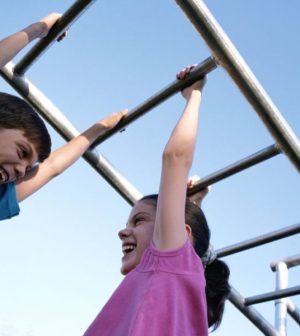- Could Your Grocery Store Meat Be Causing Recurring UTIs?
- Are You Making This Expensive Thermostat Error This Winter?
- Recognizing the Signs of Hypothyroidism
- 10 Strategies to Overcome Insomnia
- Could Artificial Sweeteners Be Aging the Brain Faster?
- Techniques for Soothing Your Nervous System
- Does the Water in Your House Smell Funny? Here’s Why
- Can a Daily Dose of Apple Cider Vinegar Actually Aid Weight Loss?
- 6 Health Beverages That Can Actually Spike Your Blood Sugar
- Treatment Options for Social Anxiety Disorder
Exercise Boosts Kids’ Brain Health, Too

A lack of exercise puts kids at risk for very adult problems, like obesity and diabetes.
Now there’s also research that links exercise to their cognitive development and achievement in school. Turns out that physical activity gives the young brain needed boosts, according to a study published in Monographs of the Society for Research in Child Development.
Active children do better in class and on tests because exercise seems to lead to larger brain volumes in areas associated with memory and thinking functions, such as behavior and decision-making. Active kids also appear to have better concentration and longer attention spans — being fit helps them stay focused to complete assignments, the study authors reported.
These findings appear to be true for children with special needs as well. Physical activity can benefit children with attention-deficit/hyperactivity disorder or an autism spectrum disorder.
The Physical Activity Guidelines for Americans recommends 60 minutes of exercise for children at least five days of every week. With the demands of school and homework, this daily goal can be hard to achieve without help from Mom and Dad.
Work with your child to discover the types of activities he or she would enjoy most. These can be organized, like joining a swimming club or sports teams, or more casual, like bike riding, jumping rope or simply having fun at a local park with friends before starting homework.
It can’t be said enough that kids copy their parents’ behavior. If they see you working out and having a good time, they’ll be more likely to embrace exercise as a regular lifestyle habit. Exercise as a family, and everyone will benefit.
More information
The American Heart Association has a wealth of tips written just for kids to help them be more active.
Source: HealthDay
Copyright © 2026 HealthDay. All rights reserved.










